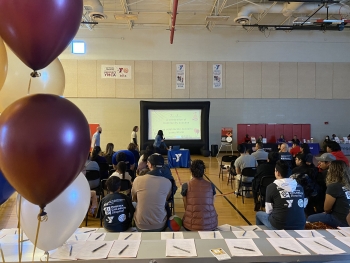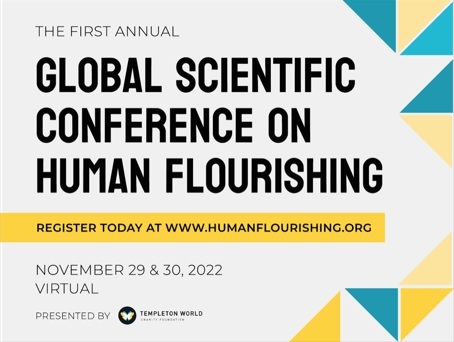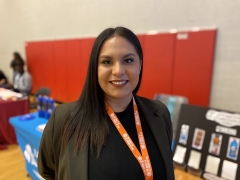At 12 years old, Jocelyne Diaz Sanchez was diagnosed with prediabetes. Being a tween, she didn’t know exactly what that meant, but that clinic visit would change the course of her life.
Diaz Sanchez’s provider referred her and her mom to a program through St. Vincent de Paul called Every Little Step Counts, which focused on equipping families with information and skills to help prevent diabetes.  Every Little Step Counts study participants and community organizations learn more about the results of the study at a community event. Download Full Image
Every Little Step Counts study participants and community organizations learn more about the results of the study at a community event. Download Full Image
According to the Centers for Disease Control, people of Hispanic or Latino descent are at higher risk for Type 2 diabetes than people of non-Hispanic, white descent.
“I have vivid memories of being in different classrooms where they were teaching me about nutrition and how to change my diet. It was me and my mom and a bunch of other families that were also trying to prevent Type 2 diabetes,” Diaz Sanchez said.
She also recalls it was the first time someone spoke to her about food without demonizing what she and her family were used to eating.
“Every Little Step Counts was the first time I was told I could make modifications to include the foods I already loved, and that I didn’t have to change some of my culture, because food does tie into a culture,” Diaz Sanchez said.
That was in 2010. A decade later, Diaz Sanchez is an undergraduate student at Arizona State University and a health educator at St. Vincent de Paul, teaching some of those same classes to other families as part of a new iteration of the program that now includes a research element.
“It’s definitely a full circle moment,” she said.
On Saturday, she was one of the program facilitators at an event at the Watts Family Maryvale YMCA that brought together past Every Little Step Counts study participants, researchers from ASU’s Center for Health Promotion and Disease Prevention and community partners including St. Vincent de Paul, Phoenix Children’s Hospital and Valley of the Sun YMCA to share the study’s findings and celebrate the success of the project.
Jocelyne Diaz Sanchez
Elvia Lish, director of the Ivy Center for Family Wellness at St. Vincent de Paul, presented the results as part of a slideshow presentation. She explained that investigators found the program can help reduce the risk of diabetes in youth and that meeting with a doctor and dietitian can also reduce diabetes risk.
They also played videos featuring past participants describing how the program impacted them and improved their health.
After the presentation, attendees were encouraged to connect with community organizations and health services. Representatives from Welsey Health Centers, Mountain Park Health Center, Chicanos Por La Causa, U.S. Rep. Ruben Gallego’s office and others were on hand to share information about the services they provide and the resources available.
The event was also an opportunity to discuss the next phase of the research, which is well underway.
“We learned a lot from focusing on kids, and we want to expand the impact. So with our new project, we’re including prioritizing entire households of high-risk families,” said Gabriel Shaibi, a professor in ASU’s Edson College of Nursing and Health Innovation.
For Diaz Sanchez, the program’s growth and transformation are inspiring.
“The work that’s being done now, I’m so proud to be a part of it and to be able to impact and give back to my community,” she said. “I see the power that an interdisciplinary team brings — especially a community-based one. I’m excited to see what’s next.”
Community organizations were on hand to share information about the services they provide and the resources available.
A key part of the event was sharing the results from the research study, which found the program can help reduce the risk of diabetes in Latino youth.
Senior communications specialist, Edson College of Nursing and Health Innovation
602-496-0983 amanda.goodman@asu.edu
Despite news headlines screaming about viruses, inflation, climate and conflict, people across the world are actually better off than at any other time in history. Understanding how humanity continues to thrive, even in the face of adversity, is the focus of the Global Scientific Conference on Human Flourishing on Nov. 29 and 30. This virtual conference is sponsored by the Templeton World Chari…
Despite news headlines screaming about viruses, inflation, climate and conflict, people across the world are actually better off than at any other time in history. Understanding how humanity continues to thrive, even in the face of adversity, is the focus of the Global Scientific Conference on Human Flourishing on Nov. 29 and 30.
This virtual conference is sponsored by the Templeton World Charity Foundation, and registration is free and open to everyone. Attendees will be able to listen to scientists, policymakers, religious practitioners and writers share their thoughts on how to ensure people do not just survive, but prosper. Conference registration is available at https://www.humanflourishing.org.  ASU was selected to host an in-person workshop as part of the Global Scientific Conference on Human Flourishing, sponsored by the Templeton World Charity Foundation. Photo by Jill Wellington/Pexels Download Full Image
ASU was selected to host an in-person workshop as part of the Global Scientific Conference on Human Flourishing, sponsored by the Templeton World Charity Foundation. Photo by Jill Wellington/Pexels Download Full Image
The conference organizers selected nine satellite locations across the globe, including Arizona State University, for invitation-only workshops focused on identifying and developing more specific ways to increase or sustain human flourishing.
Adam Cohen, a professor of psychology at ASU who is an expert in the study of religion and spirituality, was asked by the foundation to apply to host one of the satellite workshops. Cohen and Kathryn Johnson, associate research professor of psychology, were awarded a $100,000 grant to host the invite-only workshop.
“With speakers and attendees — both online and at the satellite workshops — coming from all over the world, the larger conference will offer an international and intercultural perspective on what it means to flourish. The ASU-hosted workshop will focus on the role of religion and spirituality in flourishing, because multiple studies have shown that religious people report more happiness, meaning in life and even better physical health,” Cohen said.
The ASU workshop, one of only two sites in the U.S., will take place at the Hermosa Inn in Paradise Valley, Arizona. Other workshops will happen in the U.K., Bahamas, Israel, Colombia, Rwanda, Kenya, Nepal and Stanford, California.
More than happy
Sessions of the Global Scientific Conference on Human Flourishing will explore the idea that flourishing is more than just people being happy and having their needs met.

“Flourishing is multi-faceted, and in addition to having physical, financial and social needs met, recent thinking has focused on people’s character and virtue. Are you really thriving if you are not contributing something positive to society?” Johnson said.
The conference will also examine how experiencing crises, getting through problems and even suffering can create opportunities for flourishing.
“The idea is that suffering could contribute to flourishing because it is how we learn to grow sometimes and can lead to character growth,” she said.
The role of religion and spirituality
The ASU satellite workshop will explore the role of personal growth through religious or spiritual beliefs and practices, and how these relate to whether and how people flourish.
“We will examine whether people can really flourish without religion or spirituality, where spirituality can be defined very broadly. People everywhere need to feel they have a sense of purpose and meaning in life greater than themselves,” Johnson said.
The hosts of each satellite workshop were required to set a goal. Cohen and Johnson want to understand what researchers do and do not know about the impact of religion on flourishing. They developed the guest list for the ASU workshop with intention: Attendees include economists, sociologists, political scientists, historians, psychologists and local faith leaders.
“The ASU workshop will include people coming from all over the world with expertise in many disciplines and at different stages of their careers. Our goal is to come away with a better sense of what research and innovations are needed to help spiritual leaders impact how people flourish across the world,” Cohen said.
Hava Tirosh-Samuelson, Regents Professor of history, Irving and Miriam Lowe Professor of modern Judaism, and director of the Center for Jewish Studies at ASU and Tracy Fessenden, Steve and Margaret Forster Professor of religious studies and director of strategic initiatives for the Center for the Study of Religion and Conflict will participate in ASU’s satellite workshop.
Science writer, Psychology Department
480-965-7598 dardenne@asu.edu
Contact us
